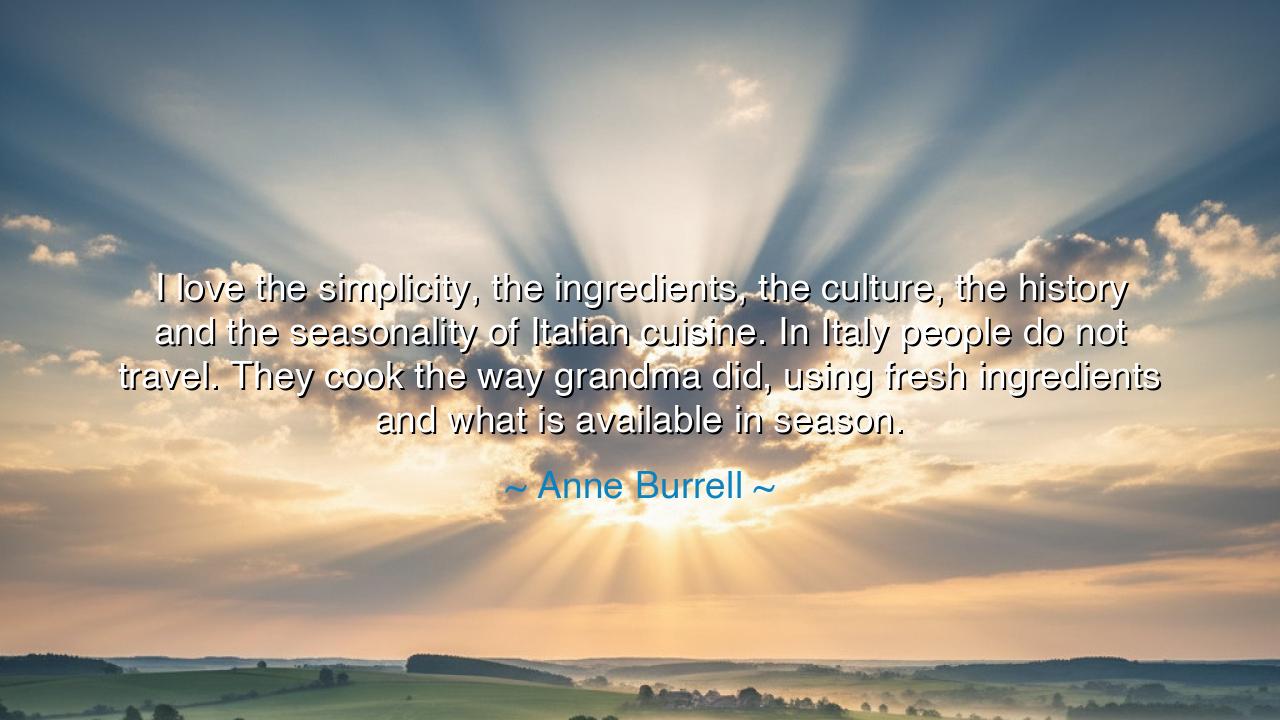
I love the simplicity, the ingredients, the culture, the history
I love the simplicity, the ingredients, the culture, the history and the seasonality of Italian cuisine. In Italy people do not travel. They cook the way grandma did, using fresh ingredients and what is available in season.






In the words of Anne Burrell: “I love the simplicity, the ingredients, the culture, the history and the seasonality of Italian cuisine. In Italy people do not travel. They cook the way grandma did, using fresh ingredients and what is available in season.” These words are not merely about food; they are about memory, tradition, and the wisdom of living in harmony with time and place. For in the kitchen of Italy, the past is not forgotten—it is preserved with every loaf of bread, every simmering pot of sauce, every herb gathered in its proper season. Burrell speaks not of recipes alone, but of a philosophy of life rooted in simplicity and continuity.
To praise the simplicity of Italian cooking is to celebrate an ancient truth: greatness often lies not in complication but in clarity. A dish of pasta, olive oil, and tomatoes can carry more joy and nourishment than the most elaborate feast if it is made with love, with care, and with ingredients that speak of the land. The ancients too knew this wisdom. The Romans ate their humble meals of bread, cheese, and olives not with shame but with gratitude, for they understood that true wealth lies in sustenance drawn directly from the earth.
When Burrell speaks of ingredients, she honors the bond between human and soil. Each tomato ripened under the Italian sun, each olive pressed from the groves, each basil leaf picked fresh from the garden is a living reminder that food is not conjured in factories, but grown in the cycle of seasons. The seasonality of cuisine is more than a practical choice—it is an act of reverence. To eat in season is to acknowledge the rhythms of the earth, to humble oneself before the turning of time, and to live in harmony with creation rather than in defiance of it.
The mention of grandma carries the weight of generations. In Italy, cooking is not only about flavor but about lineage, about the stories whispered over wooden tables, about recipes passed down like sacred texts. To cook as grandma did is to say: “We belong to those who came before. Their hands live in ours.” It is no different from the Homeric bards who sang the same verses as their ancestors, preserving memory not on parchment but in living performance. So too do Italian kitchens preserve memory in the scent of bread and the taste of stewed tomatoes.
And when Burrell notes that “people do not travel” but cook as their ancestors did, she reminds us that identity is not always found in seeking what is far, but in cherishing what is near. In an age where many look outward for novelty, Italian cuisine looks inward, to roots, to villages, to the wisdom of elders. This rootedness is itself a form of strength, for a culture that knows who it is does not lose itself in the pursuit of endless change. The food becomes a mirror of stability, of continuity, of belonging.
History, too, confirms this. After the Second World War, when Italy was torn by hardship, families survived not through extravagance but by returning to the earth and tradition. Gardens were planted, kitchens were filled with what could be grown and harvested, and meals were shared in simplicity. Out of this came not despair but resilience, for the people remembered that as long as bread could be baked, oil could be pressed, and tomatoes could ripen, life could endure. Italian cuisine is thus both nourishment and survival, a living testament to human perseverance.
The lesson for us is clear: live simply, live seasonally, live with gratitude for what is near. In your own life, seek not always the elaborate, the imported, or the new. Instead, look to your own soil, your own traditions, your own grandmothers. Cook with what is fresh and available. Cherish the meals that connect you to your family, your culture, your history. And above all, remember that the table is not only a place of eating but a place of memory and belonging.
Thus Anne Burrell’s words become a teaching for the generations: simplicity is wisdom, tradition is strength, and food is history made flesh. To live and eat in this way is to honor both the earth and the ancestors, to root oneself in gratitude, and to taste in every meal not only flavor, but the eternal rhythm of life itself.






AAdministratorAdministrator
Welcome, honored guests. Please leave a comment, we will respond soon